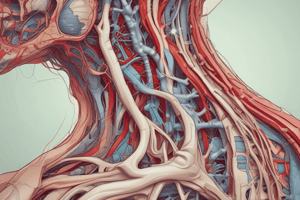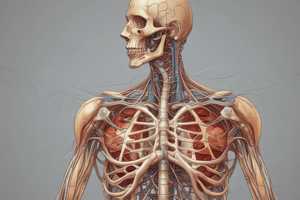Podcast
Questions and Answers
Which nerve is responsible for supplying taste to the anterior 2/3rds of the tongue?
Which nerve is responsible for supplying taste to the anterior 2/3rds of the tongue?
- Glossopharyngeal nerve
- Vestibulocochlear nerve
- Facial nerve (correct)
- Hypoglossal nerve
What is the function of the parotid gland?
What is the function of the parotid gland?
- Production of mucus in the nasal cavity
- Secretion of hormones
- Production of tears
- Secretion of saliva into the oral cavity (correct)
Which artery supplies the face with blood?
Which artery supplies the face with blood?
- External carotid artery (correct)
- Facial artery
- Maxillary artery
- Internal carotid artery
Which vein drains into the external jugular vein and eventually the subclavian vein?
Which vein drains into the external jugular vein and eventually the subclavian vein?
Which muscle is responsible for raising the eyebrows?
Which muscle is responsible for raising the eyebrows?
Which artery is the largest branch of the external carotid artery and can be found within the infratemporal fossa?
Which artery is the largest branch of the external carotid artery and can be found within the infratemporal fossa?
What is the most important branch of the maxillary artery clinically?
What is the most important branch of the maxillary artery clinically?
Why is the middle meningeal artery of clinical importance?
Why is the middle meningeal artery of clinical importance?
Where is the pterygoid plexus located?
Where is the pterygoid plexus located?
Which nerve supplies the muscles of mastication?
Which nerve supplies the muscles of mastication?
Which of the following structures does the auriculotemporal branch of the mandibular nerve supply?
Which of the following structures does the auriculotemporal branch of the mandibular nerve supply?
Where does the inferior alveolar nerve enter the mandible?
Where does the inferior alveolar nerve enter the mandible?
What is the primary method of treatment for parotid gland neoplasms?
What is the primary method of treatment for parotid gland neoplasms?
Which cranial nerve has a close relation to the parotid gland?
Which cranial nerve has a close relation to the parotid gland?
What structures pass through the infratemporal fossa and could be affected by a tumour?
What structures pass through the infratemporal fossa and could be affected by a tumour?
Which cranial nerves are involved in sensory and motor innervation to the face?
Which cranial nerves are involved in sensory and motor innervation to the face?
Which nerve supplies the muscles of mastication?
Which nerve supplies the muscles of mastication?
Which gland is located in the face and is innervated by the facial nerve?
Which gland is located in the face and is innervated by the facial nerve?
Which muscles are involved in facial expression?
Which muscles are involved in facial expression?
What will you study in the temporal and infratemporal fossa?
What will you study in the temporal and infratemporal fossa?
Which bones of the facial skeleton were damaged in the injury?
Which bones of the facial skeleton were damaged in the injury?
What other important structures of facial anatomy may have been damaged during this injury?
What other important structures of facial anatomy may have been damaged during this injury?
What is causing the streaking seen on the non-contrast CT?
What is causing the streaking seen on the non-contrast CT?
Which cranial nerves are involved in the sensory and motor innervation of the face?
Which cranial nerves are involved in the sensory and motor innervation of the face?
Which muscles are involved in mastication and what is their nerve supply?
Which muscles are involved in mastication and what is their nerve supply?
Which muscle is responsible for elevation and side-to-side movement of the mandible?
Which muscle is responsible for elevation and side-to-side movement of the mandible?
Which muscle of mastication has its origin on the zygomatic bone and zygomatic arch?
Which muscle of mastication has its origin on the zygomatic bone and zygomatic arch?
What is the space deep and inferior to the zygomatic arch, deep to the ramus of the mandible, and posterior to the maxilla called?
What is the space deep and inferior to the zygomatic arch, deep to the ramus of the mandible, and posterior to the maxilla called?
Which muscle of mastication has two heads, with the deep head originating from the medial surface of the lateral pterygoid plate of the sphenoid bone, and the superficial head arising from the maxilla?
Which muscle of mastication has two heads, with the deep head originating from the medial surface of the lateral pterygoid plate of the sphenoid bone, and the superficial head arising from the maxilla?
Which muscle of mastication has two heads, with the upper head arising on the roof of the fossa and the lower head originating from the lateral surface of the lateral pterygoid plate?
Which muscle of mastication has two heads, with the upper head arising on the roof of the fossa and the lower head originating from the lateral surface of the lateral pterygoid plate?
Flashcards
What nerve supplies taste to the anterior 2/3rds of the tongue?
What nerve supplies taste to the anterior 2/3rds of the tongue?
The chorda tympani nerve is responsible for carrying taste sensations from the anterior two-thirds of the tongue to the brain.
Which artery supplies the face with blood?
Which artery supplies the face with blood?
The facial artery is a major blood vessel responsible for supplying blood to the face.
Where does the posterior auricular vein drain into?
Where does the posterior auricular vein drain into?
The posterior auricular vein drains blood from the back of the ear and scalp into the external jugular vein, which then connects to the subclavian vein.
What is the function of the parotid gland?
What is the function of the parotid gland?
Signup and view all the flashcards
Which nerve innervates the parotid gland?
Which nerve innervates the parotid gland?
Signup and view all the flashcards
What is the main treatment for parotid gland neoplasms?
What is the main treatment for parotid gland neoplasms?
Signup and view all the flashcards
Where is the maxillary artery located?
Where is the maxillary artery located?
Signup and view all the flashcards
Which artery is important for potential bleeding with skull fractures?
Which artery is important for potential bleeding with skull fractures?
Signup and view all the flashcards
What is the most clinically important branch of the maxillary artery?
What is the most clinically important branch of the maxillary artery?
Signup and view all the flashcards
Which muscle is responsible for raising the eyebrows?
Which muscle is responsible for raising the eyebrows?
Signup and view all the flashcards
What muscles are responsible for chewing?
What muscles are responsible for chewing?
Signup and view all the flashcards
Which nerve supplies the muscles of mastication?
Which nerve supplies the muscles of mastication?
Signup and view all the flashcards
What is the function of the lateral pterygoid muscle?
What is the function of the lateral pterygoid muscle?
Signup and view all the flashcards
Where does the masseter muscle originate?
Where does the masseter muscle originate?
Signup and view all the flashcards
Where does the medial pterygoid muscle originate?
Where does the medial pterygoid muscle originate?
Signup and view all the flashcards
What are the origins of the two heads of the lateral pterygoid muscle?
What are the origins of the two heads of the lateral pterygoid muscle?
Signup and view all the flashcards
Where is the pterygoid plexus located?
Where is the pterygoid plexus located?
Signup and view all the flashcards
What does the auriculotemporal nerve supply?
What does the auriculotemporal nerve supply?
Signup and view all the flashcards
How does the inferior alveolar nerve enter the mandible?
How does the inferior alveolar nerve enter the mandible?
Signup and view all the flashcards
What structures are found in the infratemporal fossa?
What structures are found in the infratemporal fossa?
Signup and view all the flashcards
Which bones are part of the facial skeleton?
Which bones are part of the facial skeleton?
Signup and view all the flashcards
Why are the temporal and infratemporal fossa significant in anatomy?
Why are the temporal and infratemporal fossa significant in anatomy?
Signup and view all the flashcards
Study Notes
Nerves and Blood Supply
- The chorda tympani nerve is responsible for supplying taste to the anterior 2/3rds of the tongue.
- The facial artery supplies the face with blood.
- The posterior auricular vein drains into the external jugular vein and eventually the subclavian vein.
Parotid Gland
- The parotid gland is responsible for producing saliva.
- The parotid gland is innervated by the facial nerve.
- The primary method of treatment for parotid gland neoplasms is surgery.
Arteries
- The maxillary artery is the largest branch of the external carotid artery and can be found within the infratemporal fossa.
- The middle meningeal artery is a branch of the maxillary artery and is of clinical importance due to its potential for bleeding in cases of skull fracture.
- The infraorbital artery is the most important branch of the maxillary artery clinically.
Muscles
- The temporalis muscle is responsible for raising the eyebrows.
- The muscles of mastication (temporalis, masseter, medial pterygoid, and lateral pterygoid) are responsible for elevating and moving the mandible.
- The muscles of mastication are supplied by the mandibular nerve.
- The lateral pterygoid muscle is responsible for elevation and side-to-side movement of the mandible.
- The masseter muscle has its origin on the zygomatic bone and zygomatic arch.
- The medial pterygoid muscle has two heads, with the deep head originating from the medial surface of the lateral pterygoid plate of the sphenoid bone, and the superficial head arising from the maxilla.
- The lateral pterygoid muscle has two heads, with the upper head arising on the roof of the fossa and the lower head originating from the lateral surface of the lateral pterygoid plate.
Other Structures
- The pterygoid plexus is located in the infratemporal fossa.
- The auriculotemporal branch of the mandibular nerve supplies the parotid gland and the skin of the ear.
- The inferior alveolar nerve enters the mandible through the mandibular foramen.
- The infratemporal fossa contains the maxillary artery, mandibular nerve, and pterygoid muscles.
- The facial skeleton consists of the zygomatic bone, zygomatic arch, and ramus of the mandible.
- The temporal and infratemporal fossa are important for studying the anatomy of the face and jaw.
Studying That Suits You
Use AI to generate personalized quizzes and flashcards to suit your learning preferences.





